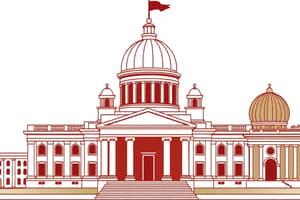Podcast
Questions and Answers
Codified constitutions are typically produced following a victory in war.
Codified constitutions are typically produced following a victory in war.
False (B)
The general idea of a constitution originated with ancient Greek writings, particularly those of Aristotle.
The general idea of a constitution originated with ancient Greek writings, particularly those of Aristotle.
True (A)
Every state has a constitution, regardless of how well it is governed.
Every state has a constitution, regardless of how well it is governed.
True (A)
The UK has a codified constitution due to a historical event.
The UK has a codified constitution due to a historical event.
Electoral systems determine how voters select their representatives.
Electoral systems determine how voters select their representatives.
Agencies for the maintenance of the union are primarily responsible for implementing fiscal and monetary policies.
Agencies for the maintenance of the union are primarily responsible for implementing fiscal and monetary policies.
Regulatory agencies are designed to encourage certain behaviors deemed desirable by the government.
Regulatory agencies are designed to encourage certain behaviors deemed desirable by the government.
Bureaus created by elected officeholders are intended to perform both essential public functions and manage emergencies.
Bureaus created by elected officeholders are intended to perform both essential public functions and manage emergencies.
Public bureaucracies are universally trusted and well-received by the American government.
Public bureaucracies are universally trusted and well-received by the American government.
A bureaucratic organization increases efficiency by promoting a rigid and inflexible division of labor.
A bureaucratic organization increases efficiency by promoting a rigid and inflexible division of labor.
Flashcards are hidden until you start studying
Study Notes
Constitutions
- Constitutions outline the fundamental principles by which a state is governed, detailing relationships among the executive, legislature, and judiciary.
- They limit power exercise and enumerate citizens' rights and duties.
- Codified constitutions typically emerge after revolutions, total defeats, regime collapses, or independence movements.
- The UK lacks a codified constitution due to its stable governance history.
- The concept of a constitution emerged from ancient Greek philosophy, particularly in Aristotle's works, who defined it as the arrangement of a state's governing offices.
Electoral Systems
- Electoral systems allow the electorate to select their representatives in elections.
- Agencies for maintaining the union include departments that manage revenue and security, such as Treasury and Defense.
- Regulatory agencies impose disincentives to curb undesirable behaviors, exemplified by the FDA and FTC.
- Agencies of Redistribution implement fiscal and welfare policies, influencing money circulation and credit accessibility.
Bureaucracies
- Bureaucracies facilitate the administration of government, executing policies made by decision-makers.
- They have essential public functions, especially during national emergencies, yet are often criticized for being inefficient or overly expansive.
- Bureaucratic structures improve efficiency by creating a hierarchical division of labor and specialization.
- Bureaucrats execute laws, enforce vague regulations, and adjudicate administrative disputes.
- Congress frequently delegates power to bureaucracies to ensure actions align with legislative intent.
Legislative Branch
- The legislative branch, consisting of Congress (House of Representatives and Senate), is responsible for law-making.
- Bills are proposed laws introduced by Congress members.
- Key powers of the legislative branch include borrowing money, regulating commerce, coining money, declaring war, and establishing post offices.
- The House has the exclusive power to initiate impeachment proceedings, while the Senate ratifies treaties and confirms presidential appointments.
Federalism
- Federalism is a governance system where two levels of government control the same territory.
- Political decentralization enhances citizen involvement in decision-making, supporting democratic practices.
- Administrative decentralization reallocates authority and financial resources among government entities for public services.
- Fiscal decentralization ensures local governments have adequate revenues and decision-making authority, often through taxes or intergovernmental transfers.
Judicial System
- The judicial system encompasses courts and legal professionals responsible for interpreting laws and administering justice.
- It plays a significant role in maintaining the rule of law, affecting public safety and national security.
- Courts ensure timely and fair trials, essential for preventing impunity and collaborating with police and prison systems.
- The criminal justice chain includes the processes of apprehending, charging, judging, and punishing suspects, involving various state security institutions.
Studying That Suits You
Use AI to generate personalized quizzes and flashcards to suit your learning preferences.




